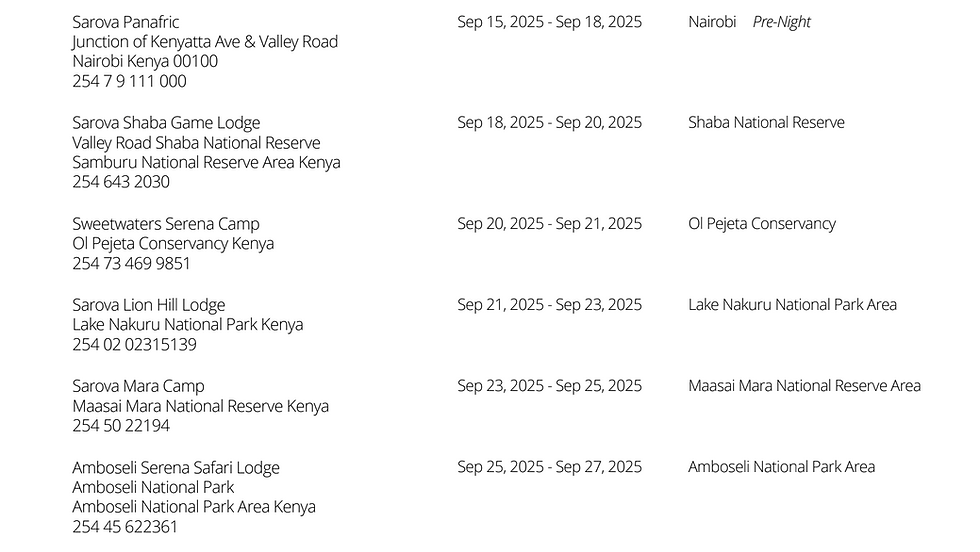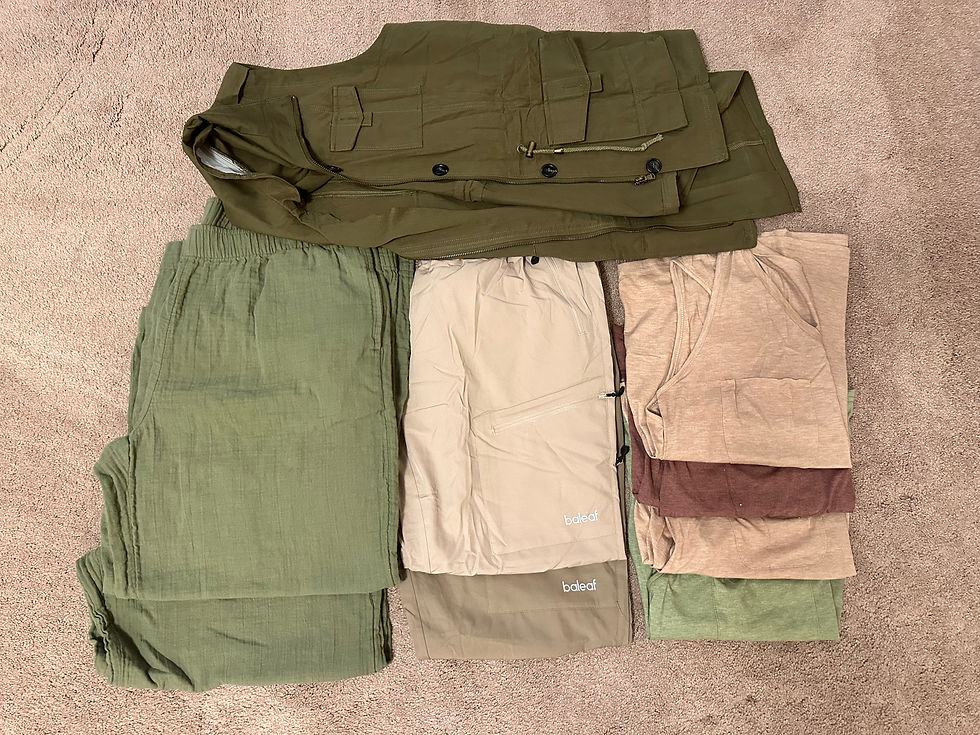Packing for a Kenyan Safari: What I’ve Learned from Research, Tour Docs, and Hard Limits
- Anna Orr
- Aug 24, 2025
- 6 min read
Updated: Aug 27, 2025
Some of the links on this site are affiliate links. This means that if you click on a link and make a purchase, I may earn a small commission at no extra cost to you. I only recommend products and services I genuinely use or believe in, and your support helps me continue creating helpful content. Thank you!
If you’re anything like me, when you start planning a trip, you don’t just research your destination—you dive deep into everything you might need once you get there.
If I’m going on an organized tour, I scour the travel documents for useful tidbits. Then I Google. And Google. And Google. I read travel blogs, photography blogs, Facebook groups, Instagram captions—and yes, I even end up on TikTok. I also make sure to read the full country profile on the U.S. Department of State website (and use their Smart Traveler app).
Kenya was no exception.
I started with my travel packet from Globus Journeys, the tour company I’m using for this trip. (Interested in tour companies or Globus in particular? Feel free to send me an email!) My travel packet included a list of the expected accommodations (with the caveat that they aren’t finalized until 30 days before departure), a day-by-day itinerary, and optional excursions.

But the real gold was in the “Important Advisements” section. That’s where you find the truly useful stuff:
Arrival and departure tips
Local laws
Health and safety advisories
Accessibility notes
Packing limitations

For my trip, a few key points jumped out:
We shouldn’t book our return flights before 5:00 PM.
Kenya has a strict ban on single-use plastic bags—bringing them could lead to heavy fines.
And the biggest gut-punch for me: due to internal flights, our luggage is limited to 33 pounds per person.
Cue the photographer’s panic.
🎒 The Packing Challenge: 33 Pounds?!

33 pounds total. That’s for everything.
And my camera gear alone weighs approximately 22 pounds.
That leaves me with just 11 pounds for clothing, toiletries, shoes, meds, and any extras—for a trip that’s two weeks long. If I weren’t traveling with my husband, I’d be rewearing the same outfit every day and deeply annoying our tour group.
🧺 What Saves the Day? Laundry on Safari.
Here’s something you might not know about going on safari in Africa:
Most safari lodges offer laundry service.
This is a huge win for travelers with strict luggage limits. It means that my husband’s and my combined 44 pounds (his 33 + my remaining 11) will be more than enough—as long as we pack strategically.
That’s where your itinerary and accommodations come back into play.
We’ll be in Kenya for 12 nights, with full travel days on each end. Based on our itinerary, I know we’ll have access to laundry on nights 4, 7, 9, and 11. Safari is dusty, so rewearing clothes without washing isn’t always a good idea. But the ability to wash and rewear is a game-changer for packing light.
☀️ What I’m Packing for my Kenyan Safari: Layers, Tones, and Practical Choices
Now that I’ve stopped panicking about clothes, it’s time to figure out what’s actually going in the bag.
Kenya during the dry season is hot during the day—but cool to cold in the mornings and evenings, especially during game drives. Add in open-top safari vehicles and lots of exposure to wind, dust, and sun, and the packing formula becomes clear:
Layers for flexibility
Sun and dust protection
Neutral earth tones (tan, olive, brown)
Avoid white (too dusty)
Avoid black and dark blue (they attract tsetse flies)
Blending into the landscape is ideal for wildlife viewing, and smart color choices help protect you from pests and heat alike.
🎒 So What’s in the Bag?
With 33 pounds to work with—and 22 of that dedicated to camera gear—every item in my bag has to earn its spot. Here’s a breakdown of what I’m packing for our two-week safari in Kenya:
👕 Clothing & Accessories

I’m focusing on lightweight, layerable, earth-toned pieces that work for both the warm days and chilly mornings on game drives. My go-to staples include:
Quick-dry t-shirts and long-sleeve shirts
4 of these v-neck tanks; colors "Coffee," "Army Green," and "Khaki"
This long-sleeved linen oversize shirt for layering in color "Green"
Lightweight fleece or pullover
One vest for an added layer
One PAKA sweater for evenings
Safari-style pants
2 pairs of high-waisted crinkle gauze pants from Old Navy in color "Bare Ground"
2 pairs of these quick-dry hiking pants in color "Suntan" and "Light Green"
Pro tip - I'm 5'5" and I got the 29" and it's the perfect length for me
A couple of pairs of leggings for evenings and travel days
Casual shoes
Listen, I live in Birkenstocks. Literally, I don't wear any other shoes. As it turns out, if you are going on safari in pop top jeeps, you can often stand on the seats to get a better view, but lots of places prefer you take your shoes off to do so. My Birkenstocks, therefore, are the only shoes I'm taking. I'll let you know if I end up regretting that choice.
Hat with a brim for sun protection
Buff or scarf (for dust)
Lightweight rain jacket
Sleepwear and undergarments
Laundry service at the lodges will not wash your undergarments. I recommend laundry detergent sheets so you can do sink laundry as needed.
Sunglasses
Swimsuit (some lodges have pools!)
A couple of casual dresses for our time in Nairobi and for dinners, just to mix it up a little
🧴 Other Useful Items
These are the non-clothing essentials that I’ve found through research to be especially useful in a safari setting:
Sunscreen and lip balm with SPF
Insect repellent (DEET or picaridin)
I really like these insect repellent wipes - so easy to travel with and I slip some in every bag, just in case!
I am also spraying our clothes with permethrin before we leave for extra protection.
Travel-size toiletries
Prescription meds and a basic first aid kit
For safari, consider including other medications for possible upset stomach like Travelan, Imodium, and DiaResQ
Reusable cloth or dry bags (for dust, moisture, or separating laundry)
Someone recommended that I use a pillowcase or scarf to protect my camera from dust while traveling between sightings.
Environmentally-friendly wipes - for cleaning your hands after using the restroom or before eating while you are out on safari, or just wiping the dust off your face and hands. I like these or these.
Notebook and pen - to record all of your sightings!
Small daypack or sling bag for game drives - can double as an extra carry-on for your return flights to bring home any souvenirs you may have picked up! I like this one.

📸 Camera Gear
This is where the bulk of my packing weight goes—and I’ve had to make some tough choices. For this trip, my photography kit includes:
Camera body 1: Canon R5 Mk II
Camera body 2: Canon R5
Telephoto lens: Canon RF 100-500mm f/4.5-7.1
Secondary lens: Canon RF 28-70 f/2.0
Extra batteries (charged!)
Memory cards (plenty)
Laptop
Lens cloths and cleaning gear
Bean bag or cushion for vehicle support
I use this bean bag and I fill it when I arrive at my destination
Backup storage: External hard drive or SSD
Camera bag that fits airline and safari vehicle limits
I currently use the Gura Gear 30L
Packing for a safari in Kenya isn’t just about fitting everything into a suitcase—it’s about being thoughtful, strategic, and prepared for a truly unforgettable experience. From dusty game drives and chilly mornings to sun-soaked afternoons and cozy lodge dinners, every item in your bag should serve a purpose. Whether you’re a photographer balancing gear weight or a first-time traveler wondering what’s essential, I hope this guide helps you pack with confidence and excitement. Now all that’s left to do is count down the days—Kenya is waiting.
🦁 Your Safari Packing Made Simple
Getting ready for a safari can feel overwhelming — but it doesn’t have to be. I’ve put together a free, customizable safari packing list PDF to help you choose the right clothing, travel essentials, and gear for your adventure. Whether you’re heading to Kenya, Tanzania, South Africa, or beyond, this list will make sure you’re prepared for everything from early morning game drives to relaxing evenings at the lodge.



Comments